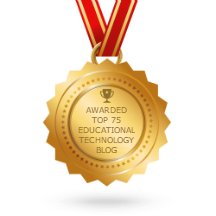While this isn’t strictly about K-12 online learning, I’m sure a submission in that area would be welcome. Personally, I’m already over-committed. But if anyone does submit something that is accepted, be sure to let us know.
CALL FOR CHAPTERS
Proposals Submission Deadline: January 10, 2009
Full Chapters Due: April 10, 2009
Technology Leadership in Teacher Education:
Integrated Solutions and ExperiencesA book edited by Dr. Christian Penny (West Chester University of Pennsylvania, USA)
Dr. Joanne Leight (Slippery Rock University of Pennsylvania, USA)
Dr. Sally Winterton (West Chester University of Pennsylvania, USA)Introduction
Technology use in schools evolves rapidly and teacher educators are required to stay current with new advancements. They depend on conferences, LISTSERVs, and other forms of personal networking to implement new technologies into their instruction. Since their sources are scattered, keeping up with the dynamic changes is always challenging for teacher educators. Therefore it is extremely useful to have a book that addresses the processes of teacher educators’ experiences for selecting and implementing emerging technology. This book will address leadership issues with technology in teacher education. Since teacher educators are responsible for delivering life-long skills for future teachers, they also need to model how they stay current with changes in technology. This book will be full of experience-based ideas about what new methods teacher educators have tried to improve their instruction, why they thought the new methods would work, what they learned from the experience, and how they modified instruction after the trials.The editors welcome contributions from colleges of education faculties collaborating with school districts, intermediate units, information technology offices, the department of education, and/or other professionals working to improve teaching at an institutional level. Case studies concerning successful grant writing can also be a topic.
Objective of the Book and Target Audience
This book will offer examples of teacher educator’s leadership supported by theories and/or empirical evidence. Practical examples will be presented so that teacher educators can more easily modify the examples to suit their unique environment to facilitate their success. The multiple-author structure of edited books simulates networking through conferences and LISTSERVs but all the book chapters will meet the common theme: what do teacher educators think and do when they adapt new technology? Unlike LISTSERVs and personal networking the book chapters will offer empirical evidences and/or theoretical framework in depth. Therefore the contents will be attractive to teacher educators at college of education who are also scholars.Recommended/Tentative Chapters include, but are not limited, to the following:
· The evaluation of instructional technology
· Teaching and learning online
· The role of video conferencing in the teaching and learning process
· Working with University’s IT department to acquire a technology grant and to facilitate a combination of text, pictures, video, and audio in Wiki
· Creating electronic evidence room for NCATE accreditation
· Curriculum development: aligning ELL requirements with technology
· Curriculum development: aligning special education
· Service learning: collaboration with local organizations
· Collaboration with school districts through technology projects
· Collaboration between the Instructional Technology office and the College of Education
· Technology grant writing
· Profiling who is likely to succeed in an online learning environment
· Instituting electronic portfolio
· Curriculum alignment and the 2008 National Educational Technology Standards for Teachers
· Working with Department of Education
· Conditions for successful e-learning environment
· Closing the gaps of the digital divide
Submission Procedure
Individual interested in submitting a chapter on the above-suggested topics or other related topics in their area of interest should submit on or before December 10, 2008, a 1-2 page chapter proposal clearly explaining the mission and concerns of his or her proposed chapter, and under which strand the chapter fits into. Authors of accepted proposals will be notified by January 10, 2009 about the status of their proposals and sent chapter guidelines. Full chapter are expected to be submitted by April 10, 2009. All submitted chapters will be reviewed on a double-blind review basis. This book is scheduled to be published by IGI Global (formerly Idea Group Inc.), www.igi-global.com, publisher of the Information Science Reference (formerly Idea Group Reference) and Medical Information Science Reference imprints, in 2010.Inquiries and submissions can be forwarded electronically (Word document) or by mail to:
Dr. Junko Yamamoto
Slippery Rock University of Pennsylvania, U. S. A.
junko.yamamoto@sru.edu
And the attachment that came with it.
Proposal Evaluation Form
Technology Leadership in Teacher Education:
Integrated Solutions and ExperiencesReviewer Number__________________ Submission Number_____________
Date Sent__________________________ Date Due_____________
Chapter Title_____________________________________________________________
________________________________________________________________________
Part I: Rankings (place N/A next to items that do not apply)
Evaluation Criteria Poor……………………….Excellent
1. Practical managerial significance 1 2 3 4 5 6 7 8
2. Appropriateness for this book 1 2 3 4 5 6 7 8
3. Adequacy of literature review 1 2 3 4 5 6 7 8
4. Adequacy of background 1 2 3 4 5 6 7 8Part II: Proposal Evaluation
Please provide detailed answers to the following questions.
1. Please supply a detailed discussion as to whether or not the information in this proposal clearly illustrates the issues, problems, and trends related to the theme of this proposed book. Please offer your constructive and analytical assessment and list suggestions for improvement and/or enhancement.
2. Please provide your opinion as to whether or not the issues, problems, and trends described in this proposal are given appropriate emphasis. Supply specific recommendations as to how the author(s) can improve in this area.
3. Please describe whether or not this proposal is properly directed to the proposed target audience of the book to which it was submitted.
Part III: Comments to the Author(s)
Please provide your constructive comments to the author(s) for improving and revising the proposal.
Please forward this completed form to:
junko.yamamoto@sru.edu






 12 Unique Blogs Are Written By Professors
12 Unique Blogs Are Written By Professors
Leave a comment